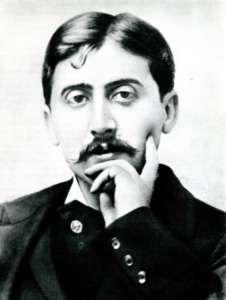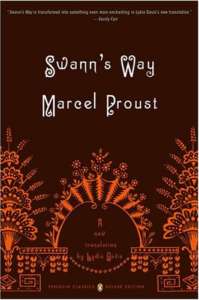
I was 19, spending a college year abroad in France and the only one in my literature class falling in love with Marcel Proust. Back stateside the following year, I actually had a framed photo of him in my dorm room next to the poem I wrote to him. In French.
As a certified Proust nerd—though I have to confess to having read only about two-thirds of the multivolume opus that makes up his masterpiece—I have been experiencing a strong wave of nostalgia in this, the hundredth anniversary of the publication of Swann’s Way. That’s the first volume of Proust’s A la Recherche du Temps Perdu, or Remembrance of Things Past (re-translated more recently, truer to the original French, as In Search of Lost Time).
With a fine array of the author’s notebooks, early drafts, galley proofs, letters, and other documents and photographs, the exhibition manages to bring to life the era, the sensibility, the grandeur and vulnerability of this celebrated author. The experience is much like the tasting of the madeleine that evokes the protagonist’s lost childhood world of Combray.
Notes make clear, by the way, that this passage—the only one familiar to most people in a work that spans 3,000 pages—was added quite late in the publication cycle, after the book was in the proof stage and after “cookie” and “toast” had been tried and discarded as the morsel that would open a door onto a flood of memories and perhaps the most influential literary work of the twentieth century.

Entering the small, dimly lit exhibition room, one is drawn immediately into Proust’s creative imagination. Photos of him with those large, heavy-lidded eyes in a paler than pale face and his chère petite Maman (with whom he was, by all accounts, much too close) appear alongside the tools of his magnificent trade: long, thin notebooks with period-clad figures on the cover, like matchbooks or thick rulers; elaborately corrected typescript and galley proofs, with crazy scribbling in the margin; endless notes in an endless volume—then, handwritten in green, the words you never expect him to utter: Ici finit le volume (“Here the volume ends”).
Proust may well have been the first self-published author. He wound up paying de Grasset to bring his pages into print after being turned down by publishers all over Paris. Before and after publication, many couldn’t understand a book in which il ne se passe rien (“nothing happens”), a book that opens with 30 pages describing how a child turns over in bed. Others hailed it an immediate masterpiece, recognizing his particular genius. The construction of his sentences is often compared to a cathedral. His themes of yearning and time and the impossibility of true love run through the entire work and, it is no exaggeration to say, change the lives of its readers. At 19 I felt I had wisdom I would not otherwise have garnered for decades.


In the small exhibition space, I found that a generation and a professional life later, it made me think mostly about my own publishing career. This is an author I would have had little patience with! Paying his own way or not, rewriting a manuscript once it’s in proof is the book editor’s nightmare. With his infamous allergies, neurasthenia, and unreasonable requests (he would routinely send his servant out in the middle of the night to fetch pastries from a favorite patisserie, only to decline them when she returned), he remains the mysterious dandy with exquisite sensibilities, the sickly young man in the cork-lined room (to shut out the noise of neighbors in his Parisian apartment, of course), the writer whose signature work will never be matched.
I soaked in this rare opportunity to be with Proust again. A second, a third, time, I walked around the exhibition cases, not wanting to leave. I heard a couple speaking French, and I was 19 again. I did what any Proust lover should do: I lost track of Time.




5 Comments
Pamela
Beautiful post!
Jenny C
I’m so glad you’re expanding your reviews beyond books. The book reviews are great, but I’d also love to see posts about inspiring music, art, dance, etc. Keep up the great work!
Karen R.
As a fellow “certified Proust nerd” I thoroughly enjoyed this piece!
Sheryl F.
Thank you, Linda, for letting me get lost in time too and return to being 19 and in France. How wonderful that the most quoted line was a revision, a late addition–there must be a life message in there somewhere!
David R.
What a vivid capturing of an eccentric genius and the unique trajectory of his opus! Your exquisite writing about Proust’s world makes me want to revisit his masterpiece, and I’m sure my reading experience would be enhanced after savoring your special piece here. Kudos!